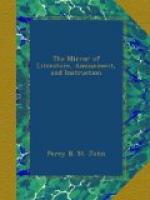“Glittering, like a palace set on
fire,
His glory, while it shone, but ruined
him!"[5]
[5] Beaumont and Fletcher.
* * * * *
SPIRIT OF THE PUBLIC JOURUNALS.
* * * * *
AN UNEDUCATED POET.
One of the best papers in the Public Journals for the present month is in the Quarterly Review, No. 87. It purports to be a notice of “Attempts in Verse, by John Jones, an Old Servant. With some Account of the Writer, written by himself: and an introductory Essay on the Lives and Works of our Uneducated Poets. By Robert Southey, Esq.” We extract such portion of the paper as relates to JONES, reserving a few notices of other uneducated poets for a future number.
In the autumn of 1827, Mr. Southey was spending a few weeks with his family at Harrowgate, when a letter reached him from John Jones, butler to a country gentleman in that district of Yorkshire, who, hearing that the poet laureate was so near him, had plucked up courage to submit to his notice some of his own “attempts in verse.” He was touched by the modest address of this humble aspirant; and the inclosed specimen of his rhymes, however rude and imperfect, exhibited such simplicity of thought and kindliness of disposition—such minute and intelligent observation of Nature—such lively sensibility—and, withal, such occasional felicities of diction—that he was induced to make further inquiries into the history of the man. It turned out that Jones had maintained, through a long life the character of a most faithful and exemplary domestic, having been no fewer than twenty-four years with the family, who, still retaining him in their service, had long since learned to regard and value him as a friend. The poet laureate encouraged him, therefore, to transmit more of his verses, and the result is the volume before us—not more than a third of which, however, is occupied with the ‘Attempts’ of the good old butler of Kirby Hall, the rest being given to a chapter of our literary history from his editor’s own pen, which, we venture to say, will be not less generally attractive than the “Life of John Bunyan,” reviewed in our last Number.
“There were many,” says Mr. Southey, “I thought, who would be pleased at seeing how much intellectual enjoyment had been attained in humble life, and in very unfavourable circumstances; and that this exercise of the mind, instead of rendering the individual discontented with his station, had conduced greatly to his happiness; and if it had not made him a good man, had contributed to keep him so. This pleasure should in itself, methought, be sufficient to content those subscribers who might kindly patronize a little volume of his verses.”
John Jones’s own account of the circumstances under which his “Attempts” have been produced, cannot fail to impress every mind with the moral lesson thus briefly pointed to by the editor. After a simple chronicle of his earlier life, he thus concludes:—




